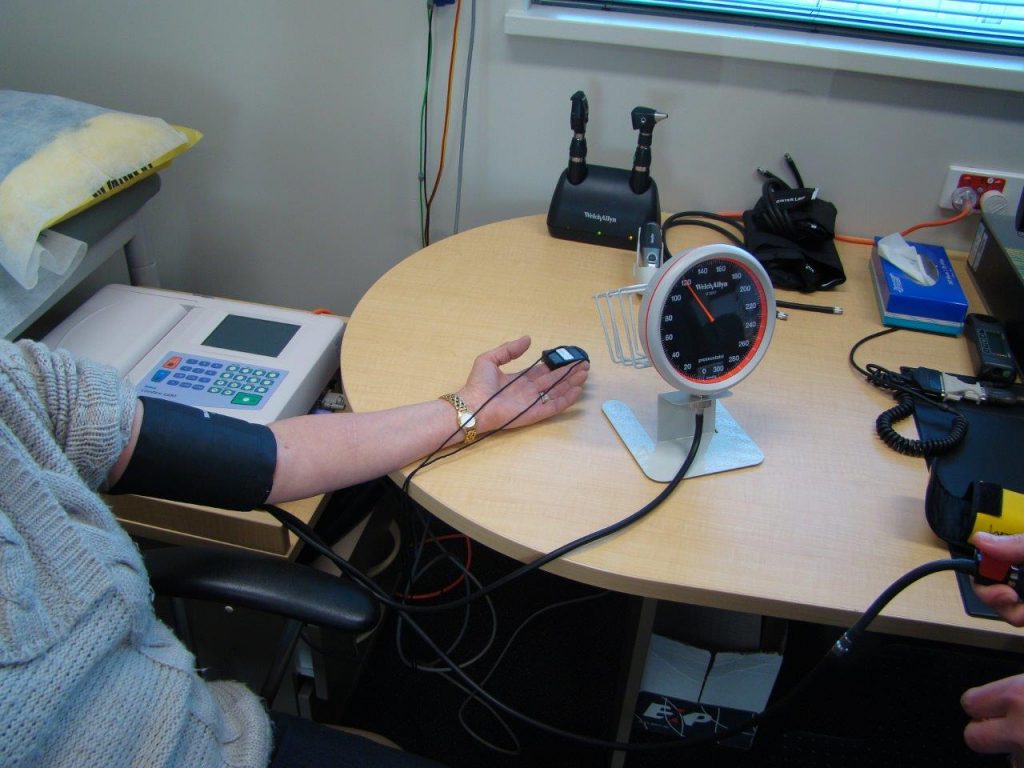The prime focus of our practice is the provision of primary care, otherwise known as general practice. We provide all aspects of primary care for individuals and families, from when a patient is conceived right through all stages of life. There are many ways in which primary care is delivered including:
- A patient presents to the GP with a specific issue requiring medical attention
- The GP uses a patient visit as an opportunity to review known medical conditions and provide care as indicated
- Preventative medicine where the GP will screen patients for common conditions in accordance with national health guidelines
- A patient has a known chronic condition that requires regular follow up and monitoring through our patient recall system
If your condition requires specialist attention, our doctors have a wide local network of specialists, as well an in depth knowledge of metropolitan specialists if the service is not locally available. We also have a network of local allied health providers that we work closely with in delivering holistic patient care. A number of our doctors also work with specialists in the local hospitals and have advanced knowledge and experience beyond primary care.
Whole of life continuity of care
Continuity of care is an important principle in primary care. Your GP is your first point of contact for all non-emergency medical issues and it is your GP that coordinates all of your medical care. Inevitably there are times when specialists and allied health professionals are required to deliver the necessary care, but your GP is the central point that brings all of your care together from day to day.
Primary Care is one of the few specialties where the doctor has a relationship with patients through long periods in their lifespan. It is not unusual to hear a patient lament that the doctor that delivered them as babies, and managed their care into adulthood and then delivered their babies, is retiring. This continuity is an important part of general practice because an intimate knowledge or your medical issues, your life and your family is invaluable in providing the ultimate life-long medical care. We know that from time to time your preferred doctor will not be available and our practice systems allow our other doctors to access your care plans and medical notes to achieve this continuity of care.
Chronic condition management and care planning
Chronic conditions are loosely defined as those conditions that a patient will be expected to have for 6 months or more. In a lot of instances these will be conditions that are managed, as opposed to cured, so as to minimise their effect on the patient into the future. Our doctors and nurses are all skilled and experienced in the management of chronic conditions. Regular monitoring and medical intervention when indicated is achieved via the process of care planning.

If you have a chronic condition your GP will often discuss your “Care Plan” with you.
Your care plan will be reviewed every 3 months to assess your condition(s) against the goals set out in your care plan. It will be renewed every 2 years, or annually if there is any major changes in your condition or treatment. Patients that are on a care plan are entitled to access a Medicare rebate on 5 visits to an allied health professional every 12 months. Allied health includes services such as physiotherapy, podiatry, exercise physiology and dieticians, to name a few. Your doctor may suggest referral to these professionals as part of the holistic care of your chronic condition.
There are other scheduled reviews for specific conditions such as asthma, allergies and diabetes that your GP will conduct if you have these conditions.
Preventative Health
Preventative health is the means by which common conditions are identified and treated at the earliest opportunity. There are many conditions that can be identified before they begin to cause symptoms through preventative health screening. This is the process of screening at risk populations for identifiable diseases or conditions that benefit from early treatment. This can be as simple as taking your blood pressure at a visit to the GP. Examples of other preventative health measures are:
- Annual blood tests for over 40s looking at blood glucose, cholesterol levels and markers of organ function
- Mammograms
- Cervical screening test
- Faecal occult blood testing for over 50s (the bowel cancer screening kit)
- Annual full skin checks
- Extended Primary Care visits, which are an annual health check for people 75 years old and over. Click for more information.
- A 45-49yo diabetes health check
- Annual full health checks for Aboriginal and Torres Straight Islander patients as part of the Closing the Gap initiative
Chronic Condition Care Plans
Over 75yo Annual Health Assessments
An annual health assessment for people aged 75 and over is provided for under the Medicare Benefits Schedule to assess a person’s health and physical, psychological and social function. This allows any health care or medical concerns of the patient or that are identified as part of the assessment, to be addressed in a timely manner. This is a comprehensive assessment including:
- A check that preventative health measures such as annual blood tests and cancer screening are up to date
- Medication review
- Immunisation check
- Physical functioning including activities of daily living
- Mental health – mood and cognitive function
- Requirement for services
This is a great way of providing continuity of care and is offered to all of our patients that are 75 and over regardless of their state of health. If you are 75 or over you, will be contacted each year by one of our practice nurses to offer you an assessment. If you wish to access the service the nurse will organise a time to visit you at home and conduct the initial assessment. You will then be booked in with your GP for 30 minutes to complete the assessment.
GP Extended Primary Care Plans for chronic conditions
Often referred to as simply a GP Care Plan, this a plan that is provided for under the Medicare Benefits Schedule to document the health care plan and treatment goals for patients with chronic conditions. A chronic condition is defined as at least one medical condition that has been present (or is likely to be present) for at least six months or is terminal. Examples of chronic conditions include, but are certainly not limited to, high blood pressure, high cholesterol, osteoarthritis, depression/anxiety and diabetes.
This is often prepared at the same time as a Team Care Arrangement, which is a second document relating to your GP Care Plan that formalises the coordination of your care by your GP with other medical and health professionals involved in your treatment. This includes other medical specialists and allied health providers such as nurses, physiotherapists, occupational therapists, dieticians, diabetes educators, podiatrists and exercise physiologists amongst others.
As part of being on a GP Care Plan, Medicare also provides a rebate for 5 sessions in a 12-month period for visits to allied health providers. There still may be a gap for seeing these providers but the rebate reduces some of the financial burden for these often-necessary services. This only applies to allied health providers, as there is already a Medicare rebate associated with seeing medical specialists.
Diabetes cycle of care
The diabetes cycle of care is applicable to all patients with established diabetes mellitus. The cycle of care should be completed annually. This enables assessment and early identification and intervention for the common complications of diabetes mellitus. The cycle of care includes:
- Assessment of long term blood sugar control (HbA1c) at least ANNUALLY
- Comprehensive eye assessment at least ONCE EVERY TWO YEARS
- Measure blood pressure at least TWICE EVERY CYCLE OF CARE
- Examine feet at least TWICE EVERY CYCLE OF CARE
- Measure lipid profile (cholesterol) at least ANNUALLY
- Test for microalbuminuria (protein leak in the urine) at least ANNUALLY
- Test of kidney function at least ANNUALLY
Activities that should be completed at least once following diagnosis of diabetes mellitus (but are often completed at many subsequent consultations) are:
- Provide self-care education
- Dietary review
- Review levels of physical activity
- Check smoking status
- Review medication
Patients with established diabetes mellitus will be contacted annually to be offered an appointment with their GP to complete their diabetes cycle of care. At this appointment the GP will ensure that the necessary care activities have been undertaken and review the results.
Asthma cycle of care
The asthma cycle of care is applicable to all patients with moderate to severe asthma who in the opinion of the doctor could benefit from review. This review will include an assessment of asthma control including day and night time symptoms, use of asthma medication and any attendances to the GP or hospital with asthma-related symptoms. Apart from documenting this assessment, completion of the asthma cycle of care also includes provision of asthma education from our asthma nurse if not previously provided and completion of a written Asthma Management Plan (or review of an existing one). Your doctor may also refer you for a spirometry to assess current lung function.
40-49yo Health Assessment
The 40-49yo health assessment is provided for under the Medicare Benefits Schedule for people aged 40-49 years (inclusive) with a high risk of developing type 2 diabetes, as determined by the Australian Type 2 Diabetes Risk Assessment Tool. The aim of this health assessment is to review the factors underlying the ‘high risk’ score identified by the Australian Type 2 Diabetes Risk Assessment Tool to instigate early interventions, such as lifestyle modification programs, to assist with the prevention of type 2 diabetes.
The health assessment should be undertaken with 3 months of a person being identified as high risk. The assessment will include a pre-screening by the practice nurse for recording of height, weight, waist measurement and blood pressure followed by a comprehensive assessment and examination with your GP.
We do not have an automatic service to offer this assessment. Applicable patients have either self-assessed themselves as being at high risk or been identified by their GP during normal routine preventative health screening.
